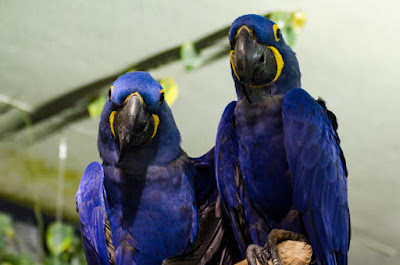Biggest Mistake We Make With Our Birds
Biggest Mistake We Make With Our Birds
A while back I wrote an article about the biggest mistake we make with our birds, you can read that here. This article is about our second biggest mistake…
This is a mistake that we make with the best of intentions. It can sideline our plans for our birds, cause us to lose their trust and cause them to lose their willingness to expand their horizons.
It is – impatience.
We live in a results oriented world. Our actions are judged by their outcome. Our employers encourage us to push forward toward goals that are set for us. We keep our eyes on the prize. Results are good things.
However, we also live in a world where we want everything done yesterday. In our hurry to achieve results in the fastest possible time we cut corners and apply pressure to those we are partnered with so we can get to where we’re going faster.
While your employer may appreciate this quality, your bird will not. Results are important to a bird, but the journey towards the goal is just as important. If the experience along the way is unpleasant, your bird will abandon ship and you will lose any hope of arriving at the place you set out for.
Your bird does not understand your great intentions – that you are trying to improve his life by making him healthier and happier. Your actions right here, right now are being evaluated by your bird and you must be careful not to risk running him off before you meet your goals.
Here are some typical examples where people make mistakes:
Pushing past your bird’s threshold of tolerance
Because they are prey animals, birds have to be very aware of their environment in order to feel secure that all is well. When something new suddenly shows up, it is suspect – even the new toy you bought for your bird to enjoy. Expecting your bird to accept something questionable by forcing close interaction with it (i.e. immediately hanging it in the cage where your bird cannot escape from it) will have the exact opposite effect than the one you hoped for. The bad experience will not only make every new thing something to be dreaded, but you will no longer be trusted either. Give your bird the time he needs to learn that you will only introduce GOOD things to his world. Be patient – not pushy and insistent for his acceptance – you cannot force a feeling of comfort.
Not knowing when to stop
A lot of people contact us asking why their bird, which used to love to train, is suddenly resistant. When we ask them to describe a typical session, we often find the reluctance is the result of the human making the experience unpleasant by being demanding and pushing the bird to do repetition after repetition. In their excitement that their bird is finally interacting in positive ways, they are inadvertently undoing all they have accomplished by drawing the sessions out way too long. Every session must end on a positive note or your bird will not want to participate in future training. For many birds, more than five minutes is too much. Take your cues from your bird and watch for signs that you should be ending the session. If you are to be successful in training, be patient – your bird’s progress is not being evaluated and he does not have to have a deadline to meet. Neither do you.
Moving from stage to stage too quickly
It warms my heart that the message is finally starting to get out to bird owners all over the world about the appropriate parrot diet and they are anxious to get their bird started on the road to a healthier life. However, as with all changes that you make to your bird’s world, they must be done in incremental stages so that your bird does not feel overwhelmed or threatened. Diet conversion is the best example of how easily derailed our plans can be while we struggle to get our bird on track with what we know is best for them. If you push too much change too fast you might very well destroy your efforts permanently, which will impact the rest of his life. Be persistent but patient. This is one of the most important things you will do for your bird.
Parrots are long lived animals. Some will be with us for the rest of our lives – literally. We should not proceed as if we are running a race against time. I am not suggesting that you put off your goals, but that you exercise patience and let the great results you are hoping unfold in a natural, unrushed way. You will have a much higher rate of success if you don’t put the pressure of expectation on yourself or your bird.
THANKS FOR BIRDTRICKS




Comments
Post a Comment